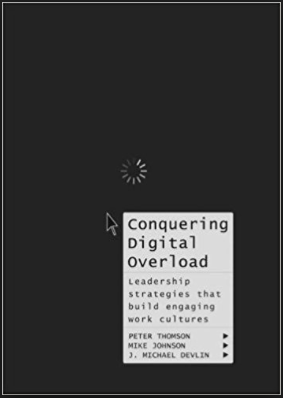Conquering Digital Overload
Leadership Strategies that Build Engaging Work Structures


This book is written by members of the FutureWork Forum, a group of professionals that explore emerging issues affecting the world of work. 16 of them have drawn from their considerable and diverse professional experiences as senior executives, entrepreneurs, faculty, consultants, and creatives, to highlight the challenges and issues the digital age is bestowing on work – and offer some potential ways to handle it.
In a world where digitalization is increasing the speed and volume of every business process and activity, many workers, and almost all knowledge workers, find themselves constantly drenched by a firehose of new data whether that be simple emails or WhatsApp messages, or management analytics created by bots, or news and views from customers or suppliers. This torrent of information is overwhelming – and creates an unsustainable environment for people to work effectively. This book explores that dilemma, and perhaps errs more in highlighting the issues than providing solutions. But that is an important first step in this emerging problem.
The opening chapter illustrates the Digital Overload issue with a fictional case study, of a middle aged couple constantly reacting to their emails, and smartphones from the moment they awake until they return to sleep; it concludes "We feel overwhelmed, constantly stressed and upset, because we never seem to get the things done we intended to" – which is surely a fair reflection of most managers and executives lives. The omnipresence of digital information means we cannot escape it – and we have yet to learn behaviours and disciplines to manage it effectively. 'Digital Natives' are no better, probably worse, at handling the 'always-connected' lifestyle – and productive engagement soon suffers from this digital attrition.
The authors establish the fault lies with organizations relying on 20th century regulations, structures and norms despite having embraced hugely disruptive and transformatory 21st century digital technologies. Their clarion call is to 'set [new] rules for human behaviour when it comes to how and when to use digital technology."
The solutions are to make organizations more human, with an appreciation "that work is performed for a purpose". Outputs need to be rewarded not inputs, so replying to emails at 3am and working long-hours become a sign of weakness not strength. Digital strategies are more than this obviously. Integrated systems that account for overall employee health and work culture have to be set decisively by leaders at all levels to reduce stress and enhance engagement and productivity. There is a growing governmental / legislative approach appearing in Europe on this too.
The authors elucidate the growing issues around digital overload well, with reference to thought-leaders of today and the past. Their conclusion is that the solution to overload is not technological, but cultural – "we all need to grow up a bit!". Organizations need to manage the expectations of when it is appropriate and when it is not to be digitally engaged and thus give workers, at all levels, permission to 'switch off' both actually and metaphorically. Ultimately, the solution is probably, as they quote from Tolstoy, "Everyone thinks of changing the world, but no-one thinks of changing himself."
Title: Leadership Strategies that Build Engaging Work Structures: Conquering Digital Overload
Author/s Name/s: Peter Thomson, Mike Johnson, J. Michael Devlin (editors)
Publisher: Palgrave Macmillan
ISBN: 978-3-319-63798-3
Publishing Date: January 2018
Number of Pages: 186
Author Knowledge Rating: 1-5 (based on their years of experience, academic expertise in subject areas, and exposure to cross-functional thinking in the area)

























































Readability: 1-5 score(1=dense and v academic; 5=frantic; page turner)









































































Appropriate Length: (1=could have been written in 25% of the length;5=could have been longer)









































































Core Idea Value: (1=nonsense (or entirely esoteric); 5=game-changer)








































































